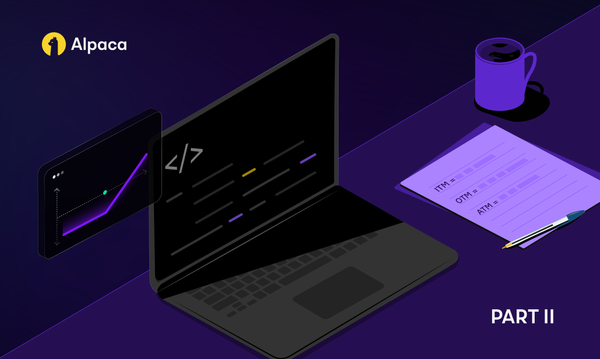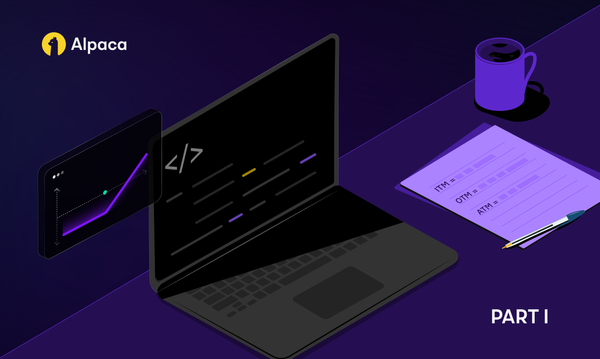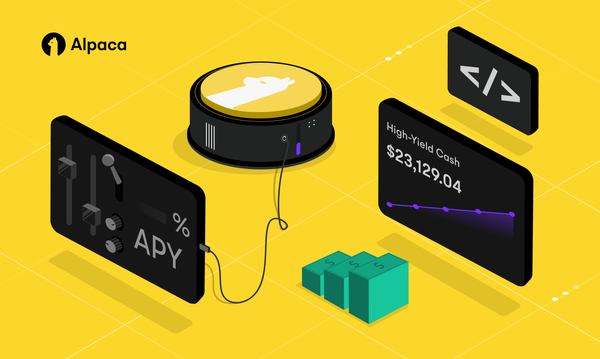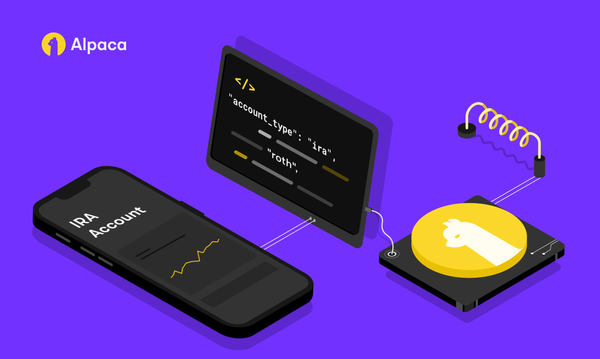Christopher Josephs from IRIS #009
On our ninth episode of Fintech Underground by Alpaca we interviewed Christopher Josephs, the co-founder of Iris, a social investment app.


Any opinions expressed are opinions of the host and their guests. Alpaca Securities LLC does not recommend any specific investments or investment strategies.
Fintech Underground by Alpaca is a podcast devoted to all topics related to stock trading and APIs. From trading with algorithms or connecting apps or building out services, we aim to bring light to the different corners of Fintech.

TL;DR
On our ninth episode of Fintech Underground by Alpaca we interviewed Christopher Josephs. As the co-founder of Iris a social investment app, Christopher discusses how Iris allows traders to communicate, share, and track other traders and influencers from the convenience of their phones.

Summary
With the rise of investing apps and the popularity of trading forums and groups, trading has never been easier. Christopher, the cofounder of Iris joins us today to discuss the reasons behind Iris and their market fit. Building upon the current fintech ecosystem as a social investment app Iris allows traders to communicate, share, and track other traders/influencers from the convenience of their phones. In addition to the multiple brokerage integrations available for users, Chris touches upon some features of Iris, their current user base, and the roadmap for the future.
Find the full transcript below. To hear more CEO/Founders of the most interesting Fintech companies speak about their experience in the industry check out our other episodes below
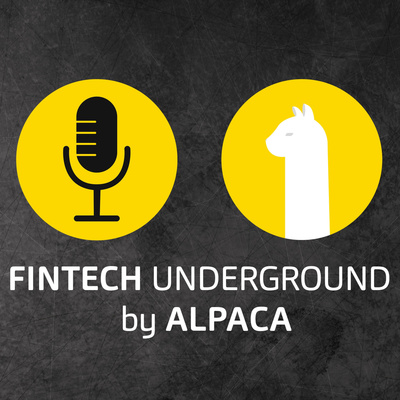
Full Transcript
Jason: [00:00:00] Welcome to Fintech Underground by Alpaca, a podcast devoted to stock trading API. From trading with algorithms to connecting apps to building out services Alpaca is built for developers and traders. And with that being said, let's get started. Hello everybody. Welcome back to Fintech Underground by Alpaca.
In each episode, we aim to explore a different area within FinTech. Today we are lucky to have Chris the co-founder of Iris, a social investment app. With the rise of trade apps and the popularity of trading forums and groups, trading has never been easier. Iris allows traders to communicate, share, and track other traders and influencers from the convenience of their phones.
Even more, Iris has multiple brokerage integrations available for users making the possibilities truly endless. With Yoshi CEO and co-founder of Alpaca here to host I cannot wait to learn more. So let's get started.
Yoshi: [00:00:50] Hey Chris, nice meeting you.
Chris: [00:00:52] Nice to meet you as well.
Yoshi: [00:00:54] I really want to say thank you for taking your time and appear on their podcast today. Fintech underground. I know we have a lot to talk about with your experience and about Iris. Do you want to give a brief introduction of what you do and about Iris Finance?
Chris: [00:01:08] Yeah, definitely. First off, I appreciate you guys for having me on I'm excited. You know, we've obviously come from FinTech, the trading world, we've known about Alpaca for a while, so it's kind of fun to see a face here a voice, you know, so anyway, we think we have a lot of things that we're building now that we can kind of work with you guys too, and kind of bring Fintech to the greater masses as well. But so yeah, my name is Chris Joseph. I'm one of the co-founders at Iris. And what we do is we're a social investing hub where you connect your broker, whether it's Robinhood Fidelity, WeBull, or Coinbase.
We're going to have all of them and you can now follow the trades in portfolios of your friends, family, popular influencers, and get real-time trade notifications the minute they make trades. We're trying to bring that social, fun, collaborative element to finance and we think the way to start doing that is by creating a broker agnostic platform that lies above all the current brokers we have.
So we launched in September tens of thousands of users in our community. We have a ton of analytics and we're kind of happy with the trajectory of what we have done.
Yoshi: [00:02:05] Great. And I appreciate that. And really looking at your profile though, you come from a pretty different background from finance, right?
You're doing sportswear and stuff like that. Like what lead you to start doing this, iris?
Chris: [00:02:18] I was actually a finance major at Villanova. So I do know the finance world. I worked in finance in New York City for a year, but I was never an investment banker. I was never really into the Wall Street, kind of sell your soul type of thing.
That was never my agenda. I'm in college. So I started a business called Custom Sports Sleeves, which is that sports compression company you're talking about. I was able to build it up and was able to quit my job in New York, where I was making enough money to travel around a little bit. And when I was traveling, I started seeing a lot of different perspectives of different people across the world, whether it was in Bali or was in Europe.
And a lot of people were talking about the stock market. And then I started thinking, you know, back in college, I was in so many group chats where I was with buddies. I would talk about crypto I was with guys, I would talk about ETFs and we would all just be texting with each other, but there was never that one platform that allowed you to see what your friends are doing.
And more importantly, literally, just get a trade notification of when someone makes a trade. There was kind of things out there that kind of did it, but I was still stuck, you know, taking a screenshot of my Robinhood and sending it to a chat. And that's kind of where the idea started. The idea frankly, really was from the group chat in college.
We had this one kid that would always tell you about trades he was making and it'd be like, dude, stop telling me, I know you're not good at trading. I can't prove it. But you're not good and I'm not going to listen to you. So it's like stop telling me this stuff. I'd rather be able to go show and say, "Hey, you're down 20% for the year".
You know, you stay in the corner, but then you had that other guy though in the same group chat. And he was telling me about NVDA telling me about IIPR. He was really, really good, but he never would tell me when he's trading. So I would have to go to him, it was like, dude, did you make it a trade today? Did you make the trade today? And it's like, why isn't there that ability to just get a notification when he makes a trade. We share fitness from Strava. We share a beer on the share my beer stuff. Why isn't there, that platform that lets you just share your trades? It's a simple thing.
It's a simple idea. It's an inevitable idea. And we think that we're young, I'm 25. We come from that generation that understands social media and also understands that we share literally everything. Finances don’t matter. Let's build it ourselves. So that's what we started.
We started back in March, launched in September and here we are.
Yoshi: [00:04:25] So Iris actually solves that problem. The friend who just kept talking about stocks and it's not good.
Chris: [00:04:32] Yeah. And I mean, take that's on the micro-level. Imagine, I mean, Twitter it's a toxic wasteland. People that just buy this, buy this, buy this. It's like, do you even own it? Like, I don't know. Do you even own this stuff? And I think COVID rapidly expedited all of this where, you know, before COVID the problem was you didn't know what your friends were trading. You'd want to know. Post-COVID now it's like, there are so many investors out there.
There's so many quote, unquote experts. Everyone has a following on Tik Tok or on Twitter. You don't know if these guys are actually good though, and they're selling a service, they're selling their trades. It's like, I don't even know if you're good. So transparency before was kind of needed.
Transparency now is needed more than ever. And Iris kind of creates brings transparency to the markets. So that you can trust who you're listening to. I know we think that's healthy for not only the micro-level of your friends but also the macro-level of investing as a whole.
Yoshi: [00:05:24] Great I think you know, you mentioned the pretty interesting thing that like your generation you love to share a bunch of the things I even didn't know about sharing the beer thing.
Of course, I know about Strava, but I didn't know about the beer thing. So that's really cool. But who are the user base of Iris? Is it your similar age group or even younger, or what kind of a user type do you see in your platform?
Chris: [00:05:47] So we have gone through waves of this and we haven't even really frankly, had the time to build out the proper way to track all this stuff.
But when we originally launched the first big bill we went after was, you know, this was pre-Gamestop. And I have to mention that this was pre-Gamestop. We were like, where are the people that are investing? You know, they're on Facebook, they're on Reddit, they're on Twitter. They're on Instagram.
The easiest way to kind of test this stuff out is let's just go after the meme pages. You know, they're all finance guys. I know them. Like I can send them a text essentially. So we partnered with a couple of the big finance meme accounts on Instagram. Got some of their users, started to understand that our target our super users are guys that actively invest in the markets and do it on Robinhood because Robinhood trader or investor is vastly different from the fidelity investor. Fidelity guys, you know, they trade once or twice a month.
Robinhood guys, they trade options six times a day. And when you have more activity, you have more chatter. You have more buzz, and they're the ones that want to talk about the investments and they want to get the trade notifications. So, those are the people who we went after originally. Now in Gamestop happened though, and everyone started trading and we got a lot of users from that kind of hype.
We also partnered with wallstreetbets on Instagram, on that Instagram account as well. They're friends of ours too. So now we, we started turning into this really frenzy of GameStop to the moon, AMC to the moon, Palantir to the moon. People loved it, but I think that's kind of tailored off a little bit.
And now we're getting a better understanding that our core users are the younger generation of investors that are in group chats that invest with their friends and like to do it socially.
Yoshi: [00:07:17] Literally like Reddit, wallstreetbets, like those, are kind of similar type of people.
Chris: [00:07:22] Yeah. And I would say wallstreetbets probably, they lean heavy, you know, degenerate.
We're definitely not that we're more so towards like actual quality investment strategies wanting to make money and, you know, just finding the brilliant people because our mission in our long-term kind of goal with Iris is we're trying to shift the management of money, or at least the persona of the management of money from these quote-unquote elites on Wall Street, which we don't have a problem with, but the elites on Wall Street, to the best and the brightest on the main street and it's because we believe there are brilliant people in every single person's micro-community that can bring financial freedom to those micro-communities.
You know, an example is Roaring Kitty. He's just some guy on the main street that found a stock, pretty good investment thesis made sense. And he just got a lot more hype for it, but we think there are a lot more roaring kitties out there that can do the same job for their communities. We just got to find them and we got to show them to the world.
Yoshi: [00:08:20] That's super interesting. And I think I would want to go to a little bit of the compliance side a little bit later, but before going there, I feel like this social interaction around the trading has been getting like in the more attention, I feel these, like in the last nine months you know, 18 months, I know that there has been, of course, StockTwits by Howard and then there's other like kind of social trading in the past, or even like eToro, you know, copy trading. Now I see like CommonStock and you know, of course like Iris but how do you position yourself from this kind of history of how the people want to see what other people are doing? And like how are you trying to learn from that.
Like, did you make any kind of analysis of why now? Like what's different now in your world?
Chris: [00:09:07] Yeah, definitely. And we get this question a lot and it makes a lot of sense. You know the idea isn't complex, the technology is complex, but probably the bigger kind of quote-unquote issue you could say would be the psychological idea of sharing this stuff.
You know, it's personal information. Do people want to do it? And I think there were two major things that happened or three major things that happened in the last year that allows a startup like this to thrive. One was Robinhood, they brought it to everyone. You know, now there are a million Robinhoods, but Robinhood brought the investing and put it in your pocket.
So that me, you know, as 20 years old in college, I could start doing this. I grew up with Robinhood. So it's like, I literally don't use anything else besides Robinhood for my kind of smaller things. But the point is I grew up with a broker that I had in my pocket. The second one that is very subtle, but it's important is fractional shares. Fractional shares were the groundbreaking event for a social investing app because that allowed users to not know how much money people had if you had a hundred dollars and I had a hundred thousand dollars.
And you had $10 of Amazon. You know as a fractional share. And I had $10,000 of Amazon via a fractional share the math checks out. It's still, what is that? 10% of your portfolio. So now when you're in a group chat with your buddies or you're following these guys, you can't just point out that one kid and be like you have 30,000 Amazon shares.
I'm not buying you lunch. I'm not going to Venmo you. So it creates ambiguity and it actually allows the users to not know how much money people have because it's all percentage-based and it's all allocated via your portfolio. And the third part is COVID. COVID brought literally everyone into the game before, you know, you would have three of your buddies and you would have the hobbyist, the professional guys on Twitter investing.
Now, you know, your sister's investing, your mom is investing everyone from college. You know, my pre-med friends in college are investing. It's just a natural thing. And crypto is amazing because it's not now a nine to five, or what is that? Nine thirty to four Monday through Friday. It's 24 /7. I was living in Bali, Indonesia after I quit my job in New York City. And I couldn't tell you how many people are just trading crypto out. There you go surf. And then you go to the cafes and they're trading crypto like this chatter and stuff has been building up forever.
And COVID kind of blew the top off with fractional shares with the democratization of finance and investing. And that's like, this is inevitable. Now it's just how do you do it properly? How do you do it under the regulatory controls and also with the retail investors, genuine concern and not, how do you educate them?
That's why we're excited, whether it's us, whether it's our competitors, we're just genuinely excited that it's going to bring more people to the market via just being social. But we also think there's a greater advantage here to actually educate the people on their portfolios and how to do it properly.
Because I don't think Robinhood's job is not education.
Yoshi: [00:11:58] No, that's great. And I'm going to use that analysis in my investor pitch as well. You know, thank you for bringing that. I think I understand now how big of a deal the fractional investing feature is. And I think that really makes sense of like what you said. You also touched crypto, like when you're in Bali, you know, there are a bunch of people trading crypto.
How do you think about that? As the relationships between crypto and the stocks, if you look at it globally, because you obviously traveled around the world, how do you see that? Like in a perspective of those two asset classes.
Chris: [00:12:31] It's interesting. I was thinking about this literally yesterday, cause I was watching chess on YouTube.
I don't know. I like to do this as well. And it's sponsored by Bitcoin and I'm thinking to myself, like why the heck is their chess people being sponsored by Bitcoin or having something to do with crypto. And I think what it is is that crypto, isn't just an asset class that you invest in. Crypto is also a fight against the establishment.
And we see this on Twitter all the time. But when you think about it finance, it's intimidating. It's not supposed to make sense. It's very complicated derivatives, you know, investment strategies, stocks. They're also only open nine-thirty to four. That's very specific to New York City, the east coast. It's not meant for everyone. Crypto though it's 24 7. There are not so many. There's no fundamental analysis and it doesn't necessarily, no one understands it. It's a lot easier a thing to get behind. So when you think about crypto as an asset class, like yes. There's kind of like there are reasons for it. There's the purpose, you know, the blockchain, it's obviously something.
But in Bali, the surfers were investing in it and I'm in California. You know, the skateboarders are investing in it. The chess people are investing in it. The gamers are investing in it. They liked the idea of crypto as an investment class, as opposed to stocks. as an investment class. And that's why I think it's a cult following.
And it's much more driven by reactions and emotions as opposed to fundamental analysis on stocks. And I don't see that ever really happening with stocks. We see it with AMC and GameStop, but that's been happening on the crypto side for years. And that's what the perspective, and that's my kind of take on it.
I think that crypto is big, it represents a fight against the establishment for people that just genuinely to their heart don't want to invest in stocks. Cause they think it just makes wall street people rich.
Yoshi: [00:14:14] So the reason why you kind of focus on now stocks is that crypto already has that kind of culture, where the people are around with, against the establishment, more kind of familiar to regular people per se.
And the stock still is very difficult or feels kind of intimidating for most people.
Chris: [00:14:33] Yeah. Yeah. And I mean it's funny, we grew up being like, don't invest in the stock market until you're educated. It's like, don't invest until but I know tons of rich families that just give money to the hedge funds and the hedge funds do it.
Why are the rich people allowed to, they're not educated. It's not their money. You know, it's, they're just, giving it to smart people. There's not the ability for the average person to give the money to smart people. So what are we supposed to do? We're supposed to invest it, but when we started investing and it's like you gotta educate yourself.
It's like, well, I got a full-time job. How am I supposed to educate myself and do all this stuff? So there's some sort of paradox that goes on in the whole idea of retail investing for the sake of building, you know, mass wealth. And that's how I think Robinhood psychologically and subtly got on top of this.
You know, the Robinhood average portfolio is $5,000. Fidelity is 150k. There's a reason for that. People are playing around with play money and Robinhood, but they're actually investing in Fidelity and they're not touching that money. And I think that's where it kind of starts. They don't know what to do too much with the average retail investor.
So what are you going to do? You're going to put in call options on GameStop on the off chance that you build a fortune, as opposed to putting in an Amazon for 10 years and making 50%, you know,
Yoshi: [00:15:46] Makes sense. So shifting gears a little bit, going to a little bit of the compliance side, because I think when I looked at a lot of social trading or, you know, social interaction in the investing and trading, it's always these topics come around where if it's investment advice or like considered to be like, registered as an investment advisor kind of stuff.
So how do you view that? And like, you know, how are you trying to, and how are you navigating that kind of conversation so far.
Chris: [00:16:16] It's interesting. And this is the iterative process that we're constantly doing research, speaking with our lawyers, or speaking with people in the field, because the first part of that question is like, is it possible?
Like, is what we technically are doing is what all the competition eventually going to do with this monetization stuff? Is it possible? And the short answer is. It is possible because other people are doing it now. There are discord communities. There are Patreons where people on Tik Tok are creating lead generation, sending them to Patreon and saying, "Hey, pay $10 a month and you'll gain access to my portfolio and you'll get access to my real-time trade alerts. None of its stock advice. No, I'm not telling you. You're buying access to this. You're not buying access to me, telling you what to do."
So there's a line there and that's what we're always figuring this stuff out.
There's no money transaction on our stuff, so we don't have to worry about that yet. But we do have the idea of its not advice. If you're getting a trade alert from me, I'm not telling you to trade it. I'm just notifying you that I have traded it. Or if, you know, you're getting an opinion, I'm not telling you to buy it. It's Hey, these are my opinions. Do what you want with it. Similar to how Twitter does it. We haven't had any problems with it yet, but we also do cover everyone on it. And then there is legal stuff that goes on Iris that does cover all that stuff. But to your point, I mean, it does always a concern and I'd be curious to see what happens because I think there's something eventually is going to have to change with it.
Yoshi: [00:17:42] Yeah, no, I agree.
And I'm glad to hear those comments and like studies from you because you know, it's always very, not clear obviously. And you know, I don't think as anyone can really figure out like, what's really the advice or not. There's a bunch of that. You know, you're right. Like there's, the same thing happening in Twitter and the same things happening in Discord and, you know, a lot of things are happening on the wallstreetbets of Reddit. And I think regulators were, you know, one time specifically trying to figure out how to stop or how to control Reddit in that when the Gamestop thing was happening. And that actually moves to the question of how are you thinking about this communication hub, right? So, what I thought was like, okay, even the regulator comes in and says," Hey Reddit, like you've got to stop this" but even if Reddit stops this you're right. There's a whole group of people who want to communicate and share. This human nature does not change.
Therefore the whole thing just moves to the different one and if that gets stopped it'll go to a different one. So it’s never ending. Right. So how do you think about that? And what are the pros and cons of having that real platform to do that? Or like, you know, having the concept of that thing just exists floating around like even decentralized way.
Chris: [00:18:55] It's a great question because I mean, there's, the answers always just lead to more questions. You know, one answer can be to build transparency. It's like, literally introduce it to say if you're doing all this stuff, if you're on Twitter telling about these stocks, disclose that you own it or not share it.
But to counter as devil's advocate would be, it's like, okay, then everyone's just going to pile in on what you're doing. And then you're going to pump the stocks off even more. So that, does that answer the question? No, but if you shut it down and you say "Hey, Twitter, FinTwit, turn it off. You know, we're flipping the switch. You can't do this anymore. "
It's like, okay, we'll just build an app. You know, we'll go to WhatsApp, we'll go to Iris, we'll go to the competitors and we'll still have these conversations. We'll just do it in a more controlled manner. I think the thing though that the regulators and all them need to think about is like, to your point, you know, it's never going to stop.
So how do you kind of mitigate it? Or how do you control it? Reddit you can't control. You just can't. Twitter you can't control either. You can call them out. You can tell them maybe a little bit. But at least there are platforms out there now that give you some sort of control and you can work with the regulators.
You can be like we know them, what they own if they say this or that. If they are trying to talk about a small-cap, worth $50 million. Like you just don't allow that being said, stuff like that. You can cap things like that. I think that the real answer is you just got to get someone on a financially focused platform where it's supposed to be finance. Because it'll never stop you just can't, it won't work.
Yoshi: [00:20:20] No, I think it becomes like a really philosophical question, right. Because I think if there's a bad actor, you know, the bad actor can do anything, everything to do it, to break this investor protection context. But like, if you try to do that, then What the hell the people just going to move to different places.
So I think it's a never-ending question, but, I think having that, always thinking about it and you're clearly like on top of that, a leader in that space and thinking about it. So it's great to hear what you are thinking because there are so much learning in this thing and the things are changing.
The new things are happening, like looking at the Game Stop. It wasn't that like two years ago.
Chris: [00:21:00] So yeah. And it's not going to be it. There's going to be more, I think the whole thing is like, how do you make it so you can protect them? You know, the regulators are there to protect the everyday guy. Transparency helps with that.
Or at least it's a step in the right direction
Yoshi: [00:21:13] Going back to the Iris specifically. So what are the next steps and roadmaps, including different asset classes or languages or different regions, or what is that roadmap that you're thinking about right now?
Chris: [00:21:27] We have some things up our sleeve. What we can say is we're very excited about the idea of a lot of people are in the markets now and COVID is going to test them. It's going to be like, are you guys here for the long run? You know, if you lose 20%, you're going to stay around.
And the data that we're seeing is they are, which is tremendous, that's the first step. The next step though, is you get in the head of who are these people that started investing, but maybe they're now leaving. How do you keep them involved? And we think if you create a passive kind of automated system where they're investing in the markets, they're doing it with their friends, they're doing it with their family, without them having to check their Robinhood portfolio or check Iris constantly.
That's I think where the idea is. And that's what we're trying to build towards the first step is get all the brokers. Plaid is great. We love Plaid but Plaid is an issue in the sense that they only refresh once a day. So having a purely, you know, trade notification platform, you've got to build the brokers out and that's what we do.
So we're working on that, but the longer-term vision, frankly, it's creating a solution for the everyday investor to stay invested in the markets, without them having to actively invest in the markets and the coin, I'm still working on it. Maybe you can help me.
It's like actively investing through passive investing because yes, I can put my money in the SPY, like yeah, whatever but I don't want to, I want to actively. I know I buy Chipotle every week. I should own some Chipotle like I want to do that. But I don't want to actively manage it. I'd rather have the ability for something else to manage it for me.
Robo advisors are boring. There's something there though. And that's what we're building towards. We have some things launching by the end of the year, which we think are going to kind of start solving.
Yoshi: [00:23:08] If that can go to the international that would be great too. I think one thing about fractional is also it really opened the door to the different countries because of the lower starting point. Right. So I think like where you're doing can be like, you know, super global.
Chris: [00:23:24] We're speaking with all the brokers listed out. I think I'm trading 212 is a big one out there. eToro obviously kills it. I don't know. They already have some social, but trading 212 is on our radar as well.
So we. We do fully understand that
Yoshi: [00:23:37] Great. I mean, that's great to hear, So wrapping up the conversation I always ask this question, but you know, again looking back to the things that we talked about, you know, super exciting stuff at the same time, a lot of painful stuff like compliance and regulations.
So I feel like, it's pretty specific to this Fintech area that we have to think about it and, you know, have to really worry about those things to figure things out. So is it worth it to be in this FinTech industry compared to like, you know, other pure tech products, what is your feedback on that question?
What about the other tech products?
Chris: [00:24:12] They're limited to their own thing. Everything is a finance or a FinTech app. If you make it a FinTech app. I think working in FinTech is the most important thing because people rely on the products you built, you know, I would live without Instagram. I'd be alright.
You know, I would live without Strava. I'd be okay, but I can't live without Robinhood. And we think that with Iris, they're passing the Baton, you know, their IPO and they can't continually launch new revolutionary stuff. We want to grab that Baton and say, okay, you guys brought it to someone like me in college who enjoyed investing.
I'm now going to bring it to the 8 billion people that don't even know where to start with investing. And we're going to do it through transparency. We're going to do it through trust and we're going to do it through social. And we think that if we can bring investing to the masses of people that don't even know how to start investing.
That's where we can bring financial freedom to those communities. And that's why it's worth it. If we can help more people make money and gain exposure to the markets, that's a job well done on the Iris side and that's a job well done and all the FinTech. You know, cash app, does it, Venmo does it. Our competitors are doing it hopefully. We just want more people exposed to the markets because of the power and the longevity of the American economy.
Yoshi: [00:25:19] Now everyone should have a part in it. I agree on the same page, like, you know, Alpaca's vision is really bringing accessibility to that people via the infrastructure. So yeah.
Thank you very much, Chris, for sharing a lot of your thoughts and a lot of I think deep philosophies around a lot of complex things, so I really appreciate sharing your process. So thank you for coming on the board, talking about stuff.
Chris: [00:25:39] Thank you for having me.
Let me know if In a year, maybe we'll be something different. And we can talk about that because things change once a week in the investing world.
Yoshi: [00:25:47] Completely agree. That's why, so it's exciting. Right?
Chris: [00:25:49] So thank you, man. All right, man. Have a good one.
Jason: [00:25:52] I also wanted to thank all of our listeners for joining us today on this episode of FinTech underground by Alpaca. As always check on all of our past episodes on all major streaming platforms podcasts can be found. Thank you.
If you liked this episode of Fintech Underground by Alpaca make sure to check out our other episodes below

You can also follow Alpaca and our weekly updates on our LinkedIn and @AlpacaHQ on Twitter!
Brokerage services are provided by Alpaca Securities LLC ("Alpaca"), member FINRA/SIPC, a wholly-owned subsidiary of AlpacaDB, Inc. Technology and services are offered by AlpacaDB, Inc.



